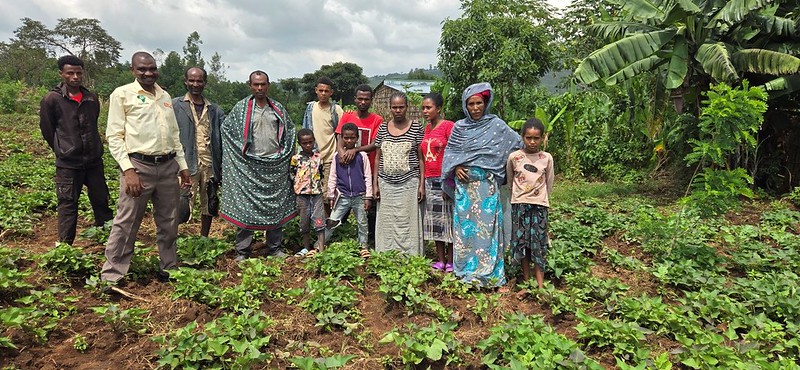Ethiopia: How TAAT is Transforming Lives through Orange-Fleshed Sweet Potato Varieties

In a landmark effort to enhance food security, nutrition and economic resilience, the Orange-Fleshed Sweet Potato (OFSP) Compact of Technologies for African Agricultural Transformation (TAAT), led by the International Potato Center (CIP), established an innovative partnership framework with the Ethiopian Institute of Agricultural Research (EIAR) in 2023.
The partnership which was formalised through a Sub-Grant Agreement between the partners sought to revolutionize OFSP production in Ethiopia by focusing on the production of Early Generation Seed (EGS), equipping Decentralized Vine Multipliers (DVMs) with high-quality planting materials, and creating awareness among farmers about the nutritional and economic benefits of OFSP.
A central pillar of this initiative is the Wondo Genet Agricultural Research Centre (WGRC), a vital EIAR research hub. WGRC has allocated one hectare to the multiplication of clean planting material for four high-performing OFSP varieties: Kabode, Alamura, Shafeta, and Dilla.
Under TAAT’s tutelage, each variety was carefully selected to address specific challenges:
- Shafeta: Early maturing (95 days), with uniform root size and strong resistance to weevils, ideal for urban markets and moisture-stressed areas such as Tigray.
- Kabode: Drought-tolerant with moderate pest and disease resistance, offering reliable yields even under challenging conditions.
- Alamura: Known for its adaptability and high yield potential.
- Dilla: Performs consistently well across diverse environmental conditions.
Since the agreement was established, WGRC has distributed more than 500,000 vine cuttings to farmers, research entities, and NGOs. The proceeds from vine sales have reached ETB 250,000, which WGRC aims to reinvest in the ongoing production of EGS and expand its operations into new territories.
Beyond vine production, WGRC is empowering farmers with knowledge and skills.
The centre has trained 70 farmers (42 men and 28 women) in agronomic and post-harvest handling practices tailored to OFSP.
Training sessions are complemented by food demonstrations showcasing OFSP’s versatility in enhancing traditional Ethiopian foods like porridge, injera, and bread. The impact of these efforts is evident as OFSP becomes a household favorite, valued for its taste and nutritional benefits, particularly among children.
The success of OFSP is perhaps best captured in a village near Shashamane, just 15 kilometers from WGRC. Dubbed the “OFSP Village,” this community has embraced OFSP as a valuable cash crop, fetching up to ETB 60 per kilogram, significantly higher than maize.
For farmers like Mr. Tashome, OFSP has become a transformative opportunity.
His initial harvest was so successful that he expanded cultivation to a larger field. Similarly, local women leader Ramate Desta has seen her women group farmers grow from 10 to 30 members within a season, inspired by OFSP’s potential.
Another success story is Shahitu, a farmer who has positioned herself as a vine multiplier and supplier. Strategically located along a main road, her farm attracts buyers seeking high-quality OFSP vines, known locally as Sukar Dinich.
WGRC’s success positions it as a key driver of OFSP expansion in Ethiopia. The centre can develop a robust business strategy to scale its operations and create a self-sustaining model that enhances food security, improves nutrition, and boosts economic growth.
The TAAT-CIP-EIAR partnership exemplifies the transformative power of collaborative agricultural research, farmer training, and community engagement. As WGRC and the “OFSP Village” continue to thrive, the future of OFSP in Ethiopia looks promising, with far-reaching benefits for nutrition, livelihoods, and economic development.
Established in 2018 as a central pillar of the African Development Bank’s Feed Africa strategy, TAAT represents a transformative initiative to reverse the trend of declining food productivity in Africa through the scaling of modern food production technologies to 40 million farmers across Africa, focusing on supporting young people and women in low-income regions.
TAAT has scaled up the dissemination of heat-tolerant wheat varieties, drought-tolerant maize, high-yielding rice, cassava, high-iron bean, sorghum, millet, orange-fleshed sweetpotato varieties and high-quality livestock breeds, and fingerlings to more than 12 million farmers, boosting crop production by an estimated 25 million tonnes. This increase in food production is a testament to the programme’s effectiveness in enhancing agricultural productivity across the continent.
TAAT acquires cutting-edge technologies from developers and agricultural research institutions led by the CGIAR for several agricultural value chains covering crops, livestock and fisheries, vets them for scaling readiness and integrates them into its electronic technology catalogue.
TAAT engages governments to integrate proven technologies into their large-scale agricultural investment programmes and partner with the private sector to commercialise them.



